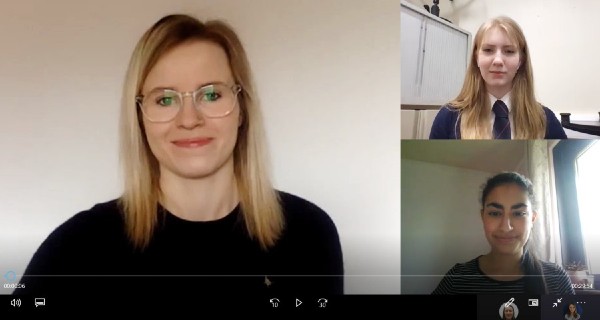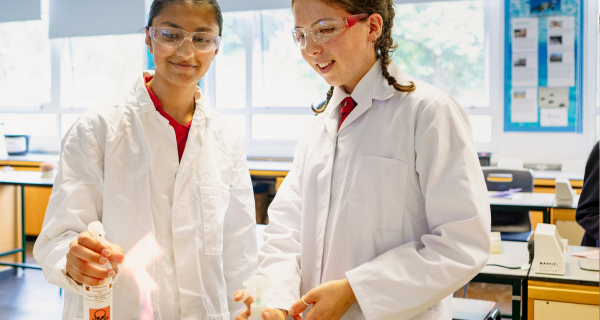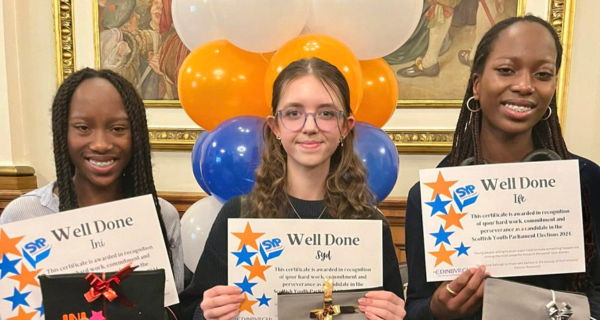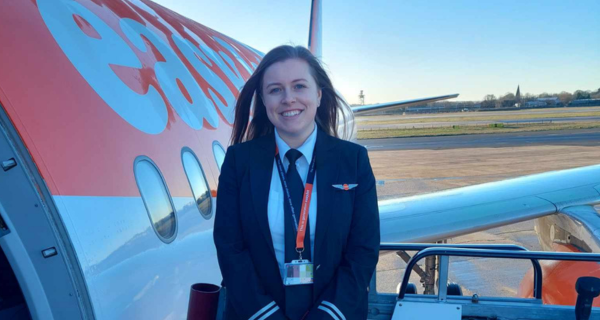Dr Christina Mackaill is a Former Pupil of The Mary Erskine School and a junior A&E doctor, who plans to specialise in both emergency and space medicine. She has published first-of-their-kind papers on CPR methods for space and advanced life support guidance for use in space.
We were grateful that Christina (2008 Leaver) found time between shifts in A&E and her medical research to join an interview with MES School Captain, Lily, and Mariam, co-founder of the MES Medical Careers Club. Conducted on MS Teams, Lily and Mariam were ready to find out all about Christina’s career, in a traditionally male-dominated sector, her path to presenting her own research to NASA, and whether humans might one day live on Mars.
Christina shared her insight on overcoming imposter syndrome and how The Mary Erskine School helped her to believe that she could do anything, enabling her to feel confident presenting to NASA experts.
Firstly though, a very important question…
What is a Space Doctor?
Although Space Medicine is not a well-known discipline in Scotland at the moment, it is a lot bigger in the USA, through NASA and in Europe, with the European Space Agency. In a nutshell, space doctors look after astronauts before they go into space, whilst they’re there, and when they come home again.
If you can imagine, when astronauts go into outer space they enter an environment called microgravity. A lot of things happen to the body in this environment; muscles become weak without the exertion of gravity, bones lose density, vision deteriorates, and more. Space medicine is all about finding ways to make sure these medical issues do not stop astronauts from doing their job, enabling them to carry on exploring and conducting research. It really is a very exciting field, totally different from traditional medicine. If we want to visit Mars or go back to the moon, we have to make sure astronauts can adapt and stay healthy in a new environment.
What inspired you to take this unusual career path?
I always knew I would like to go into medicine, and I’ve always had an interest in space. I loved sci-fi films and visiting planetariums! When I heard that space medicine existed, I saw a career that would allow me to tap into both of these interests. Although space medicine has been around since the 60s, I liked that it was a relatively new concept in the UK and in Scotland, so there’s a lot still to be discovered and work to do.
Space travel and space has traditionally been an area dominated by men. Do you think being at an all-girls school like MES had an effect on your choice?
One of their missions at school was to make us strong, independent women and get us geared up for going into the world. I always felt that MES drilled into you that you can do anything. After going to MES I've never really been phased by gender inequality. I would go to conferences and present to a big room full of men and it wouldn't phase me because I felt that I was equal and that I deserved to be there. I think that feeling was definitely drilled into me from school because we were encouraged like that.
There’s a lot still to do to balance gender inequality in both medicine and the space sector. I read recently that only around 11% of all astronauts have been female, but having the force of the MES mindset behind me has definitely made me feel more comfortable in my career.
What do you love most about your job?
In terms of working in emergency medicine, the best thing about A&E is that no two days are ever the same - you often have to think quickly on your feet and you are challenged daily. Then, what really excites me about space medicine, is that there’s so much still to learn! There is a lot yet to be discovered, especially as we plan to travel deeper into space. Currently, if someone on the ISS is really unwell, there is potential to evacuate them home. If we plan to go to Mars, however, our astronauts will be a lot further from home and we will need to be able to treat them in space without hospitals or the plethora of medical equipment we have here on Earth. The thought of being part of solving these problems is what really drives me.
We read that you pioneered a new method of CPR for use in space. How was that experience and how did it feel to accomplish this?
I worked on this with Dr Thais Russomano, an amazing Brazilian physician and space expert. I contacted her and told her I was really interested in space medicine, and she kindly invited me to her lab in Brazil to conduct research on CPR in space. In conducting our research we ended up proposing a new method entirely through our findings. This was so unexpected, and the paper really opened doors for me. This was my first big research project and then the following year I found myself in America presenting our findings to NASA experts – it really felt like I was dreaming.
From there, I went on to set up Scotland’s first Space Medicine Society, won awards for our research and continued working with NASA. The whole experience brought me out of my shell. Coming from a small town in East Lothian, it made me realise there’s no limits to what you can achieve especially when you’re passionate about something.
Would you say that this research and your CPR method is the proudest moment of your career?
After presenting our research in America for the first time to a room full of NASA employees and space professionals, I really did wonder how I would ever top that experience! But since then, I went on to work with a big group of international doctors and researchers to develop the first advanced life support guidance for use in space, which was just published in November 2020. To explain, the most serious medical emergency would be a cardiac arrest and we have now published the first guidance for this event taking place in space – the first of its kind.
At the moment, I’m writing a paper with the Chief Medical Officer at NASA. I never thought in a million years I would do that, so once this paper is published…I think I might have peaked!
On the flipside, what would you say has been the most challenging part of your career so far?
The thing I have struggled with the most and found challenging has been imposter syndrome. I am lucky that I have always felt supported by family, friends and colleagues – we always lift each other up - but I think a lot of women suffer from imposter syndrome and you have to tell yourself that you are deserving of your achievements. The way I tackle this is by reminding myself that I don’t attend conferences or give talks to ‘show-off’, I do these things because its what I love and I hope to inspire others in the process. I quite literally want to encourage others to reach for the stars - metaphorically or physically!
Something we could probably all learn from is finding out how you cope with stress?
When it comes to stress, I remind myself how I cope with high pressure situations in emergency medicine. In A&E there’s obviously many stressful things that can happen in any given day, whether that’s increased patient numbers, very unwell patients – or both! I have to take a step back, prioritise who to help first, thinking about who is the most unwell or has been waiting the longest, whilst keeping morale high and staying level-headed.
I now try and do this in all aspects of my life. If I’m stressed outside of work, I take a step back and think about what really matters in the grand scheme of things. Working with space is also really good at helping me put things into perspective. When I think about how infinite space is, I question why we stress about the small stuff.
Aside from being a space doctor, is there anything else you’re looking forward to when it comes to hopefully one day actually spending time in space?
I’m currently looking at aviation training for the future which would allow me to begin the journey of becoming an astronaut. Alongside practising space medicine, I think astronauts must have an amazing sense of perspective, looking back down at earth, and it must clarify what really matters to you in life. I don’t think anyone can fully appreciate that feeling until you’re there, so I think that would be amazing. I also love to think that I could contribute to a part of advancing humankind. To be one of the first people to visit a new planet, to be part of the future of space innovation… that’s so exciting! Who knows, in 200-500 years we could be living on Mars, and astronauts today could be the beginning of that future.
Do you have one piece of advice for pupils at ESMS who might like to follow a similar career path?
If I could say anything to myself at your age in school, it would be to just go for it.
Believe in yourself and don’t set limits or create your own barriers. We sometimes make excuses to not push ourselves as hard as we can, but don’t be scared of the outcome – good or bad. And remember, there’s a big world after school so don’t worry if you don’t achieve everything you want to right now, long term there’s so much time for you to achieve your ultimate goals and dreams.
I know that there are a lot of women I meet at conferences and panels who are interested in space and space medicine, so I’m excited to see the gender gap start to close here. I know that the European Space Agency have been recruiting recently and have stated that they’re actively looking for more gender balance in the field. I would love to help encourage more women to get into the field.
What’s your fondest memory from MES?
I loved school! I loved being in the CCF and all of the different camps we would go to, and being part of the hockey team. I made great friends at school who I’m still close with today. A lot of my teachers had a great sense of humour and I remember them to this day! Our Christmas show was always amazing too. Lots of fond memories.
Lastly, what’s a book you’d recommend to anyone you meet?
I’m reading a book at the moment that I’ve not quite finished yet, but it’s called Invisible Women. It’s about the fact that the data for medicine, car requirements, the size of your phone etc., is all based on data gathered about men, and how this affects women in every day life. For example, when someone comes into hospital maybe with typical heart attack symptoms, these are based on male symptoms. You might actually miss a heart attack in a woman because they might present completely differently! In a car crash, we might be less likely to survive a crash because air bags are designed for men. It blows my mind! Just another reason why we need to close the gap.
I also have lots of books about the Holocaust, specifically I would recommend the graphic novel Maus, about a survivor of the holocaust. It’s so important to honour those victims by reading and hearing their story. I also always read and reread Call of the Wild – amazing story about strength and survival!






